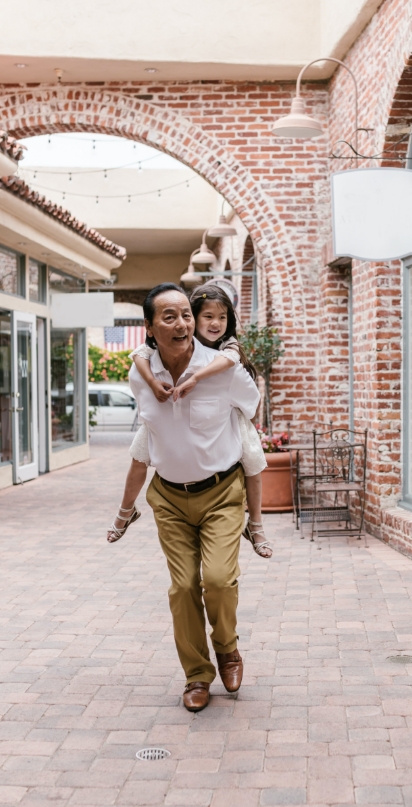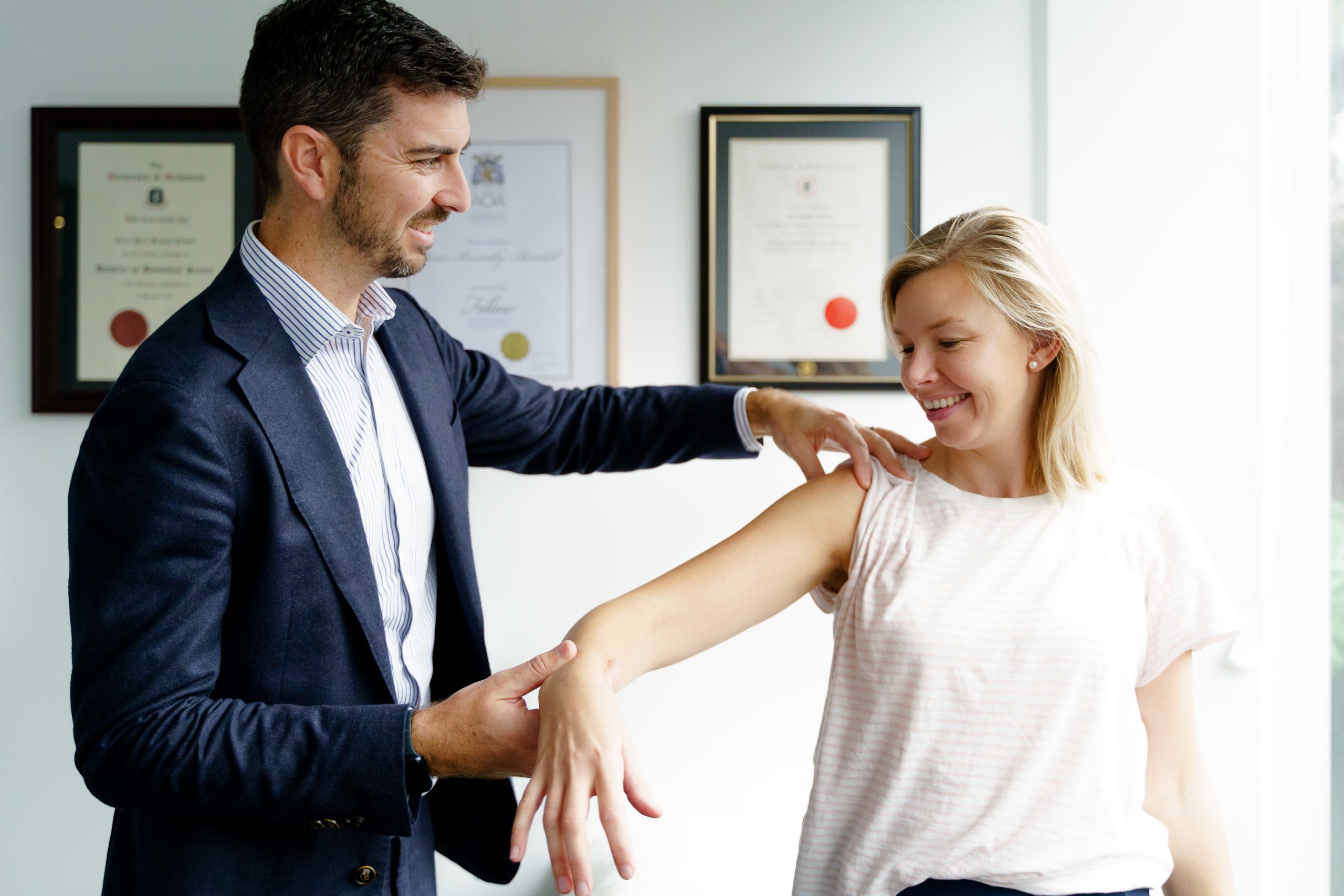Rotator Cuff Tears / Impingement
Tendinitis and Bursitis
Rotator cuff impingement happens when the tendons of the rotator cuff muscles, supraspinatus, infraspinatus, teres minor, and subscapularis, are compressed within the narrow space under the acromion.
This compression leads to tendon irritation, inflammation, and potential shoulder pain. Over time, repeated friction can damage the tendon fibers, leading to partial or complete tears.
If untreated, impingement can cause progressive weakness, stiffness, and loss of shoulder function.


Who Is at Risk of Rotator Cuff Tears?
Rotator cuff impingement and tears can affect anyone, but they are most common in individuals performing frequent overhead motions.
Athletes in swimming, tennis, baseball, and other high intense sports are at higher risk, same goes for manual workers such as painters, carpenters, and mechanics.
Age-related degeneration also plays a role, as tendon elasticity decreases over time. Additional structural changes like bone spurs or thickened ligaments can further narrow the subacromial space.
Risk factors include:
- Overhead sports or repetitive lifting at work.
- Age over 40, when tendon wear accelerates.
- Poor posture, which alters shoulder mechanics and increases tendon strain.
Symptoms
Clear symptoms of rotator cuff impingement often develop gradually, starting with discomfort during overhead activity and progressing to pain at rest or during sleep. One hall mark sign is called a “painful arc”: discomfort when lifting the arm between 60° and 120.
Full tears can result in sudden weakness, difficulty lifting objects, or an inability to raise the arm above shoulder height.
Common signs to watch for:
- Night pain that disrupts sleep, especially when lying on the affected side.
- Weakness when rotating or lifting the arm.
- Clicking or popping sensations during movement.

Treatment options
Treatment depends on the severity of the injury, ranging from conservative measures to surgical repair. Most mild to moderate impingements respond well to non-surgical management, but persistent pain or a confirmed tear may require surgery.
Non-surgical treatments
- Ice and rest
- Anti-inflammatory medication
- Exercises and stretching aimed at regaining shoulder strength
- Conduction of infrared treatments or an ultrasound to promote blood flow to the shoulder
- If these treatments are ineffective, cortisone injections may be administered.
- Surgery may be recommended if the pain remains after 6 to 12 months.
Surgical treatments
Mini open surgery
Dr Brumby-Rendell’s preference is for keyhole surgery; however, if the tendon tear is complex or large, it may need a mini open incision (approximately 4 cm) to accurately repair the tendon. This technique is well-proven and has the same outcomes as keyhole rotator cuff repair.
Arthroscopic (keyhole) surgery
Arthroscopic techniques are a fantastic way to address pathology in the shoulder using multiple small keyhole-sized incisions. Dr Brumby-Rendell uses keyhole incisions for all shoulder arthroscopy procedures to address bone spurs, damaged tissues and soft tissue repairs. Dr Brumby-Rendell utilises minimally invasive methods to aid recovery and reduce post-operative pain.
Recovery from surgery
Generally, patients remain in the hospital for one day or less.
Depending on the surgery type, patients may return home on the same day as their operation. Post-surgery recovery consists of shoulder immobilisation via a sling and the application of cold packs to the affected area. These measures will reduce swelling and pain, and reduce the risk of complications. Dr Brumby-Rendell will monitor your healing and prescribe medication for pain if required.
The tendon often takes a lengthy period to heal. Your healing arm will have a restricted movement range throughout the first 6 to 12 weeks post-surgery. Dr Brumby-Rendell does not advise pushing or lifting heavy items during this time, as such could result in re-tearing internal structures before they have properly healed.
Physical therapy and exercises aimed at strengthening your muscles will commence after around 8 weeks. It is very important that you commence a supervised shoulder rehabilitation program for optimal recovery.
Recovery Timeline
Returning to work after rotator cuff surgery
Before your surgery, it is important that you discuss with your employer a return-to-work plan.
Depending on your specific surgery, your arm will be immobilised with a sling for 2 to 8 weeks.
After your check-up with Dr Brumby-Rendell (2 weeks after surgery), you will be able to perform non-strenuous, altered duties. However, you must wait a minimum of 3 months before partaking in activities that contribute to shoulder stress (i.e., heavy lifting).
Driving after rotator cuff surgery
Quality care provided by an orthopaedic surgeon.
After rotator cuff surgery, it is important that you refrain from driving until you can do so safely. If you drive too soon post-surgery, you could risk your recovery and the safety of yourself and other drivers.
Dr Oscar Brumby-Rendell's recommendations addressed below are a generalised guide of what may be expected after your surgery and should be used only as a reference. It is important that you discuss with Dr Brumby-Rendell your travel needs and recovery expectations before your surgery for individualised information.
Post-surgery, you will wear a sling for 2 to 12 weeks, depending on the severity of your condition and your specific procedure. Immobilising your arm will reduce healing complications.
Dr Brumby-Rendell advises that you do not drive for at least 6 to 8 weeks after surgery.
For safety reasons, you must not operate a vehicle using one arm. You will increase the risk of damaging your healing shoulder by driving too early, and your ability to drive may be deterred by the consumption of pain medication.
Do not drive until you are no longer using a sling, are free from severe pain, and can perform driving manoeuvres safely. In your consultation, Dr Oscar Brumby-Rendell can provide a medical assessment of your driving capabilities.
Frequently Asked Questions
Small or partial tears may improve with rest and targeted physiotherapy, but complete tears rarely heal without medical intervention. Early assessment can prevent worsening damage.
How Dr Oscar Brumby-Rendell can help
During your consultation, Dr Oscar Brumby-Rendell will carefully assess your rotator cuff condition and work with you to design a personalised treatment plan aimed at restoring your shoulder strength and mobility. He will also guide you through:
-
The type and severity of your rotator cuff tear or impingement, including whether it is partial or full-thickness.
-
Tailored treatment options — from physiotherapy and injections to advanced surgical repair if required.
-
Possible risks or complications associated with both the condition and different treatment approaches.
-
Whether surgery is necessary to achieve optimal recovery or if non-surgical methods may be effective.
-
Your expected recovery timeline after rotator cuff treatment or surgery, including rehabilitation milestones.
-
Short- and long-term functional outcomes, so you know what to expect in terms of pain relief, mobility, and shoulder performance.

Ready to learn more?
Watch more about Rotator Cuff Tear and Impingement with Dr Oscar Brumby-Rendell here.
Read more about shoulder injuries here
Once you have a referral…
Book your consultation here.
